Like clockwork: as a summer touring storm brews, the live music industry bands together
As the sector returns to its first true peak in three years, the industry’s biggest players are working together like never before to keep the show on the road.
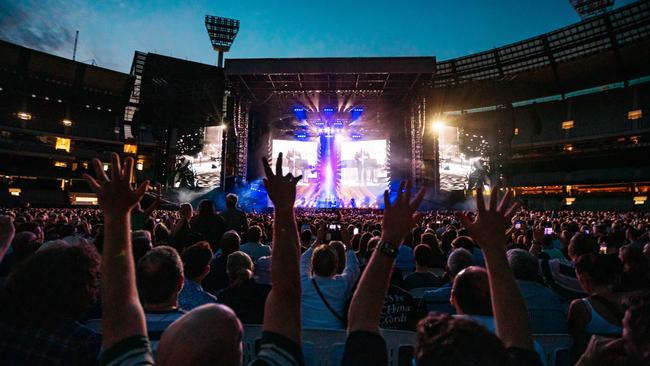
Amid the crowd at any live music event, the desired effect is one of seamless immersion. Time, space and emotions distort when you watch and hear your favourite artist reprise your favourite songs just the way they sound in your memory.
In those moments, nothing else matters: the onstage action pulls your entire focus and all other concerns vanish, as melody, rhythm and movement become your world. Sometimes that feeling lasts for two minutes; if you are particularly lucky, it may last for two hours or more, while surrounded by people who feel the same way.
When things are going to plan in the live environment, there’s an element of mass hypnosis at play. The very best concerts are those that function as if under the spell of a magician’s wand, where the collective sleight of hand is so silky smooth that you are misdirected from ever contemplating what needs to occur before the house lights go down.
“If you do a trick that fools people, it brings out a huge amount of wonder,” the American magic performer Penn Jillette has said. “Doing something wonderful and beautiful for other people is an end in itself.”
This is a story about the work of live music. Long story short: things are really hard right now for those charged with booking, building and delivering concerts and festivals across Australia.
Backstage and beyond, a top note of white-knuckled desperation hums above the usual rivalries, camaraderies, wins and losses. Interviews with senior industry members reveal a situation so intense that the biggest touring companies are sharing information and resources like never before, so that they might all survive a very trying period.
This summer, for the first time in three years, there is a gluttonous smorgasbord of entertainment options on offer. On the festival front, there’s established names in Laneway (headlined by US sister rock trio Haim), Falls, Wildlands, Beyond the Valley, SummerSalt (led by sibling duo Angus & Julia Stone) and By The C, as well as debuts in Knotfest (three cities) and Heaps Good (Adelaide).
Major tours incoming include Elton John’s final run of stadium shows, as well as Arctic Monkeys, Sting, Rod Stewart, Lil Nas X, Harry Styles, Lorde, My Chemical Romance and Red Hot Chili Peppers, with many of these sold out.
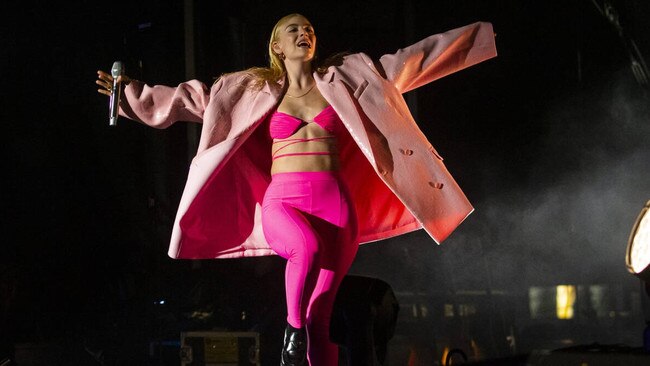
In February, the one-man show by British pop singer-songwriter Ed Sheeran across nine stadium dates in five cities will demand the use of roughly half the 200 or so trucks available to the nation’s music industry at any one time.
All this is great for fans deprived of potentially life-changing music experiences during the pandemic.
The stacked schedule is good news for music industry workers, too, who invest their days, nights and lives into learning to execute these events like clockwork.
But this is not the same group who manned the decks of the pirate ship known as the Australian live music industry circa December 2019. Plenty of highly skilled professionals have since walked the plank into other jobs and found the benefits of a life off the road; a life not lived in near-constant motion.
“We’ve lost a lot of good people, who through necessity have had to go out and find other work, and some of them haven’t come back,” says Travis Hogan, event director at Frontier Touring.
“Some of the shine of our business has gone away; the movie business in Australia is booming, for example, and we’ve lost a lot of good (production) people to it.”
The brain drain is real. The experienced workforce that remains is passionate but weathered, and soon to be riding the waves of burnout once again, if it’s not already. Old heads are charged with attempting to train up the new, some of whom have never known a full-scale Australian summer touring circuit, while also ensuring that their own workload is completed fully and safely, so that the show can go on.
Nick Marson is a veteran production manager who has worked on many major tours, from the first Big Day Out in 1992 to Good Things, a rock-centric festival held earlier this month on three consecutive days in Melbourne, Sydney and Brisbane, and headlined by British act Bring Me the Horizon.
A true nuts-and-bolts operator, his highly specialised role involves wrangling equipment, people, artists and their respective crews well in advance of show day, then overseeing every aspect of show delivery once punters begin to file through the gates until long after the last straggler leaves at the end of the night.
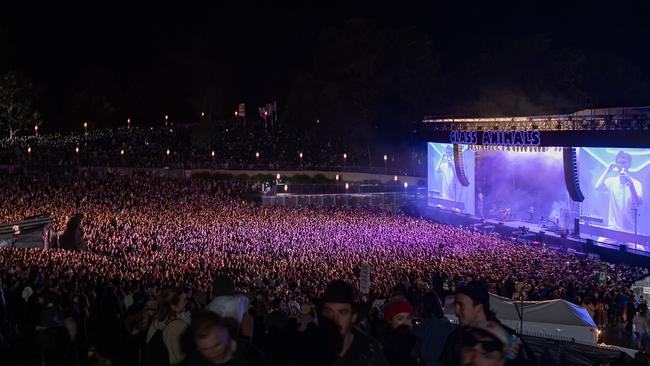
If he and his colleagues do their job well, they’re practically invisible, and the artists on stage perform their magic tricks without anybody thinking about the men and women behind the curtain. But of late, he’s finding that the stress and headaches have been considerable, as he scrambles to navigate supply chain and workforce issues.
“One promoter asked me a while ago how I was doing with the workload, and I said, ‘Well, on paper, my workload has probably doubled – but in reality, it seems to take five times as much effort to do what I used to do’,” Marson tells Review.
“From my point of view, it’s definitely the toughest it’s ever been,” he says. “I’ve been in the business for nearly 40 years, and never seen this workload that we’re under at the moment. Covid put a halt to everything for a while there, and now it seems that every band in the world has started their touring cycle all at the same time. We’ve never seen it this busy, in this country – but it’s the same all over the world, from what I’m hearing.”
Now that the summer touring season is well under way, “there’s a lack of resources,” Marson says, “there’s just not enough PAs, lights, trucks and labour. Then you chuck all that through a 30-plus-per cent price rise across the board, and that’s having an impact on the promoters; and the lack of resources is having an impact on my side of the industry.”
He says all this on a phone call during a brief moment of sleep-deprived downtime between big gigs, having swung directly from the three-date Good Things run – which was attended by more than 90,000 metal, rock and punk fans – into joining a sold-out national tour by North American bands The Offspring and Sum 41; both tours are presented by Destroy All Lines, an independent event promoter. With a sense of ironic understatement, Marson says with a chuckle: “It’s hard work.”

When Michael Newton first laid his eyes on the spreadsheet, he could scarcely believe it. Months ago, he learned, some bright spark on the production side of the live music industry had taken a punt on starting a document that listed all their upcoming tours, set to take place at many of the nation’s biggest venues.
This person noted which suppliers they were dealing with for essentials like staging and audio equipment hire – and then they shared the spreadsheet with their competitors, who responded by adding their own shows and suppliers, too. In effect, it was an expanding database documenting the sector’s busiest Australian summer on record.
“I thought it was fantastic,” says Newton, promoter of the outdoor winery series A Day on the Green, which recently held its 500th show since 2001. “The promoters are all competing for the same artists, and the same ticket. But underlying that, there’s all the production managers, staging and crew people who work together so beautifully, seamlessly and cooperatively underneath the dog-eat-dog (rivalries) at the top,” he says with a laugh.
That bright spark was Nik Tischler, vice-president of production and logistics at Live Nation Australasia, who created the spreadsheet in early 2021, back when varying state government health restrictions and border closures meant that interstate touring was impossible, while international artists were locked out of our island entirely.
Halfway through last year, when gigs weren’t happening at scale, Tischler foresaw the need to solve what he calls a “new problem: a decimated supply chain, a scarcity of resources, and the generally narrow-minded, stubborn people who inhabit the production world”.
“That was the kick-off, so I had to pick up the phone, eat some pride, and start planning,” Tischler tells Review. “That’s what it was born out of. It’s been really good, because I think now we’ve created a new culture of co-operation and open-mindedness. I’m passionate and committed to the industry and my colleagues, and wanting to behave as decently and ethically as we can. I found that spirit in people who work across the different companies, too. It’s been great, and I think we all should be proud of it.”
In the view of Frontier Touring’s Hogan, the spreadsheet represents a transparency never before seen in the sector.
“The whole industry has come together at the delivery level, because we need to,” he tells Review. “We need to deliver shows all on top of each other, and we all pull from the same labour pools of trucking, riggers and technicians. So to do that, we’ve had to play nice, if you like. The level of co-operation between all the promoters in Australia right now is unprecedented – but that’s how we’re getting through.”
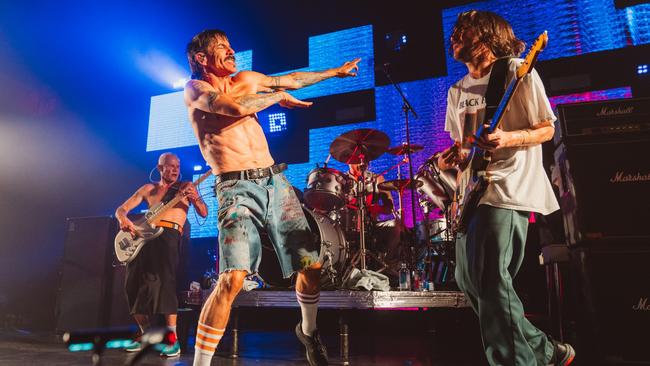
As well, the three major concert promoters – Live Nation, Frontier and TEG – recently came to an agreement to install the same PA system into the Brisbane Entertainment Centre, Sydney’s Qudos Bank Arena and Melbourne’s Rod Laver Arena, then left it in place for the next team to use.
“We are each others’ competition, but at our level, we’re fairly friendly,” says Hogan. “We all very quickly identified that this is going to be a cluster of a season, and there is no other way but to work together.”
In the Queensland capital, that spirit of resource-sharing has meant US hip-hop artist Kendrick Lamar, children’s group The Wiggles, Las Vegas rockers The Killers and country-pop king Keith Urban all used the same PA system for their respective concerts in the past month – a quirk of history that may never happen again.
“When the promoters first broached it with us, we said, ‘Absolutely – we’ll work with you on how to do this’,” says Trish McNamara, general manager at the Brisbane Entertainment Centre.
“As a group, we all want to see the industry thrive. We’ve just been through the most difficult time; we want to get this industry back, we want it to be successful, we want people to have positive experiences, and we’ve got to do whatever we can to ensure that can happen successfully.”
In those three indoor arenas, JPJ Audio is the company that installed the PAs – a K1/K2 system by French manufacturer L-Acoustics – and Jim Straw is its chief executive.
“As the industry was stretched, we worked out how to utilise the gear we had to maximise the shows that promoters needed to do,” says Straw. “It reduced trucking, travelling crew around, riggers, stage hands, and hopefully reduced fatigue. That was the idea behind it.”
According to Roger Field, president of Live Nation Asia Pacific, such a collaboration – all but unthinkable three years ago – is a hangover from a pandemic that shoved the entire entertainment industry into the same boat. Unusually for hangovers, it’s a welcome one, too. “Without cozying up too much, there’s a really sensible sharing of information around what’s in the tour pipeline and what gear is around,” he says. “We can actually mitigate some of the risk of delivery by just disclosing with each other where we can share gear, or leave it in situ, instead of moving every tour around with a completely independent set of resources and rig.”
“It’s been quite a new and fairly mature approach to making sure that we all have the ability to deliver what we’ve committed to,” says Field. “But the main motivation has been the safety and competence of dealing with the resources we can access, and actually trying to find ways where we can reduce the work that’s required, through commonsense things that don’t necessarily normally happen.”
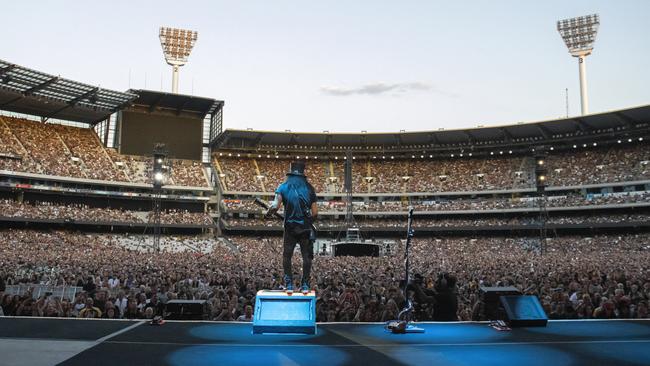
In July, the team behind the three-day Byron Bay festival Splendour in the Grass was planning to celebrate a belated 20th anniversary, but a confluence of events saw its Friday performances cancelled due to extreme weather, while labour shortfalls in the areas of transport, security and bar staff had flow-on effects for about 50,000 ticketholders on site.
Its Saturday and Sunday music programs were ultimately delivered as planned, and the artistic highlights were many across a muddy weekend. Yet in hindsight, what happened at Splendour was effectively a canary in the coalmine for what the sector is facing this summer, as outdoor concerts remain at the mercy of unpredictable weather events, as ever, at a time when the pool of workers available is unusually shallow.
Nearly five months after the winter event, Splendour co-founder Jessica Ducrou is presently preparing to present Falls Festival in Melbourne (December 29-31), Byron Bay (Dec 31-January 2) and Fremantle (Jan 7-8). Last month, she and her team also took a punt on debuting a two-day event, Harvest Rock, which attracted about 15,000 people per day to two adjacent parks in central Adelaide; it, too, copped a beating from mother nature.
“The intolerance to inconvenience from our audience is at an all-time high, and so that pressure for us to deliver like a Swiss watch is felt – but like all industries, we are challenged in a world with limited resources at this point,” says Ducrou, co-CEO of Secret Sounds, a tour and festival promoter whose major stakeholder is Live Nation.
Of the packed summer calendar, she says: “I’m not worried about the ability to deliver; I’m concerned about the end of La Nina, and how that might affect the festival season. But I’m also concerned about our audience, and their capacity to have a little bit more compassion and understanding for where we’ve come from. We were one of the first industries to close, we’re the last to open, and we’re operating in a very, very difficult circumstance.”
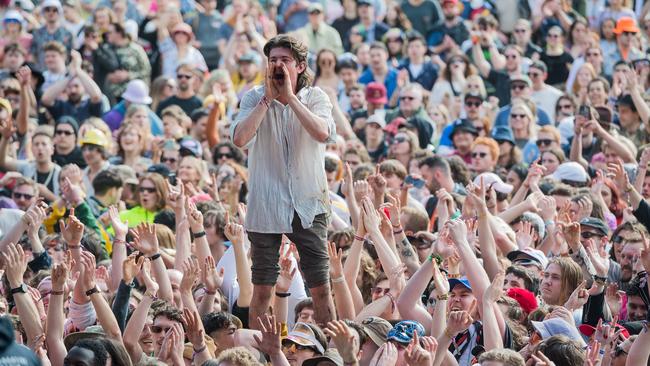
As Christmas approaches, major tours including Guns N’ Roses and Rufus Du Sol have recently finished up. Piano man Billy Joel played to about 76,000 people at the Melbourne Cricket Ground on December 10, and his one-off big gig used the very same stage and PA system that Axl Rose, Slash and co had used there a week earlier.
Same venue, different promoters: Frontier Touring brought out Billy, with the assistance of the Victorian government via its Always Live initiative, while TEG Dainty presented Guns N’ Roses across six stadium dates.
Yet several hundred thousand dollars and countless hours were saved by keeping that equipment in situ at the MCG, rather than trucking it out and back in again.
It was a case of big businesses playing nice together by necessity. But was it a brief respite in the endless war between cutthroat rivals, or the green shoots of a kinder, gentler coexistence?
“Commonsense things like that are really just smart business, and honestly, from my point of view, I have no qualms at all about it being extended,” says Geoff Jones, chief executive of TEG. “I can see no reason why we wouldn’t do it; it just makes sense. Me and my company want the industry to continue to thrive, because that’s good for everybody. That sense of collaboration is there, and it’s appropriate, even though we remain very strong competitors.”
That sentiment is echoed by Dion Brant, chief executive at Frontier Touring. “I’d like to see it continue,” he says. “There are better efficiencies if we are able to work together as a sector and if we can bring suppliers, venues and all the people we rely on along with us as well.
“We spent a lot of time talking to each other as we were going through Covid, and hopefully one of the positives that comes out is that we have a bit more understanding of each others’ positions.”
When told that the three bosses at TEG, Live Nation and Frontier are all singing from the same song sheet on this matter, during interviews with Review, Brant laughs and says: “Lucky I didn’t turn around and say, ‘Nah, screw them!’”
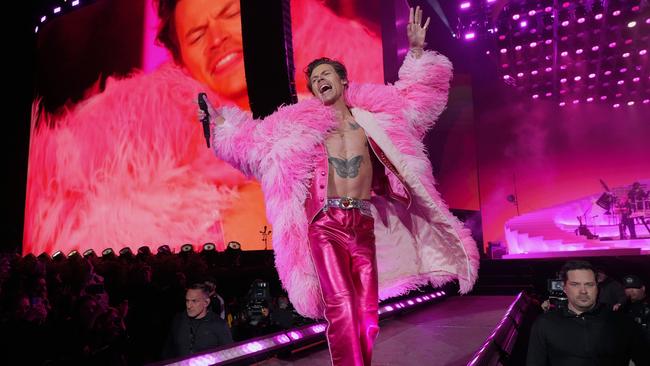
At stake this summer and beyond is the consistent delivery of live entertainment across the nation’s music venues and festivals. It’ll be a near-run thing, but cautious optimism is the watchword.
Barring any further weather-related catastrophes – or Covid cases impacting the workforce more than it already has – the live music sector will pull through.
It helps, too, that stadium tours by Justin Bieber and Foo Fighters booked for November and December were postponed or cancelled, respectively, for different reasons: Bieber’s health concerns, and the shock death of Foos drummer Taylor Hawkins in March. Had they gone ahead as planned, the nation’s touring sector might have been stretched to a breaking point nobody wants to consider.
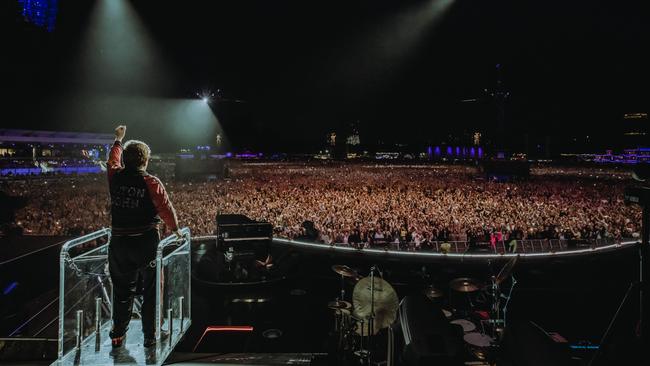
In the meantime, whenever the house lights go down and the show begins at a music venue near you, the magic trick begins anew, as the heart of each attendee fills with the hope of encountering another life-affirming concert, or etching another fun-filled festival into the memory bank.
Behind the scenes, a small army of workers sits invisibly, poised and watching, having been entrusted with performing a trick that reliably produces positivity. Doing something wonderful and beautiful for other people is an end in itself.






To join the conversation, please log in. Don't have an account? Register
Join the conversation, you are commenting as Logout